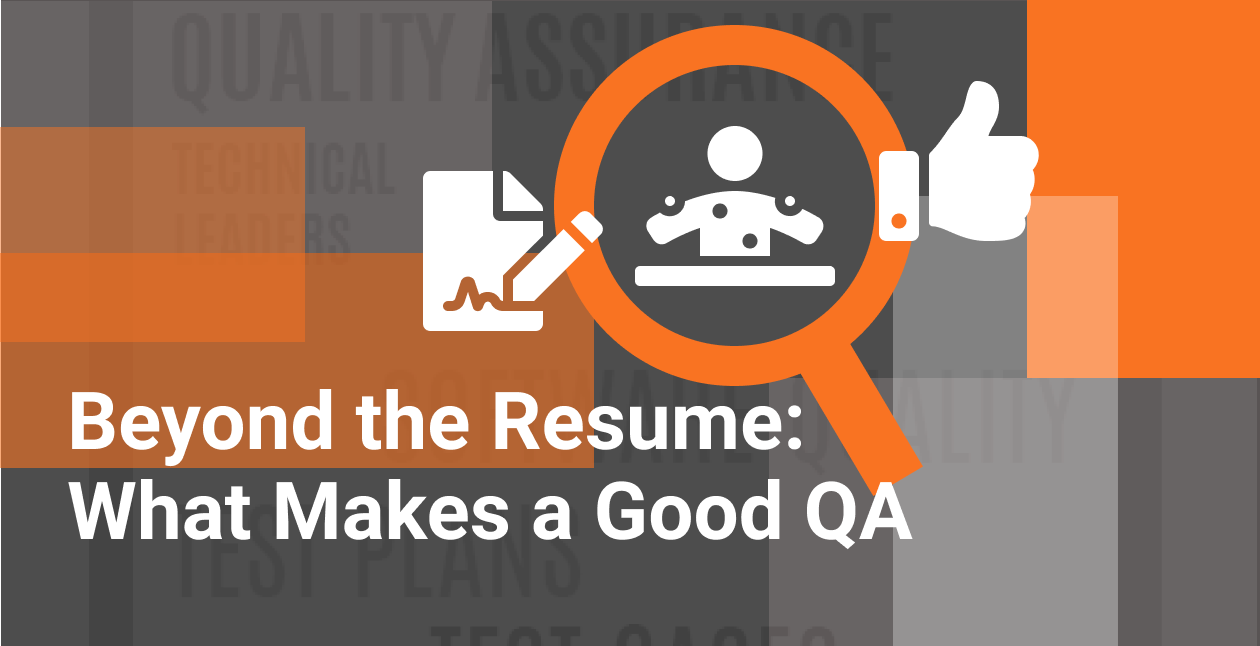Just as important as their technical background, a great QA engineer exhibits these five qualities.
Quality assurance (QA) engineers are indispensable to software development. They save money otherwise spent on delays, budget overruns, and maintenance, help keep customers happy, and maintain the good reputation of a company. Naturally, such responsibilities wouldn’t fall on just about anyone that comes knocking on your door. As with any job, finding the right fit depends on how well one fits the objective and subjective criteria of a team.
Strong background and expertise with development methodologies, processes, and tools are more than a good place to start. These are often the easiest filters as they’re what people highlight on paper. If they also have some background or relevant skills in business, then you’ve got a promising candidate.
But don’t jump into making an offer just yet. Look out for these less obvious qualities, and learn how to bring them out of a potential hire:
Thorough and disciplined. As a person settles into routine work, it’s easy to be complacent and make mistakes. This can be a costly risk for your business. In QA, one might spend hours doing repetitive tasks, executing the same test cases over and over, and writing one report after another. You wouldn’t want them to lose focus and interest in the work easily. When they can remain meticulous and self-motivated despite the familiarity, they’re also likely to care for the product like an owner and help the developers shape it to its best form.
To test their attention to detail, ask: How do you manage QA tasks when requirements are poorly defined?
Empathic and compassionate. The increasingly social aspect of our digital lives has allowed customers to openly express how they feel about their experience of a product and be heard. Software is no exception, and great QA engineers understand that ultimately they’re prescribing improvements to meet the expectations of complex human beings. The ability to empathize with what makes them feel good or what frustrates them when using an app or program—on top of understanding the technical requirements—is a rare but critical skill.
To check their emotional intelligence, ask: What do you do to get into the user’s shoes?
Ever-curious and a tireless learner. It is a universal trait that’s valuable for almost any professional role, including QA engineers. For one, technology evolves. Today’s trends may be forced into irrelevance tomorrow. Things like artificial intelligence (AI), extended reality (xR), and blockchain in a few years, if they haven’t been rendered obsolete, might look completely different than they do now. The standards by which these technologies are evaluated and the tools used to test them will change as well. Given the strategic nature of QA work, engineers need not only be aware but knowledgeable of shifts happening in the specific spaces their products live in.
To see whether they are receptive to new ways of doing, ask: What excites you about software development today?
A team player. Both QA and development sometimes need the reminder that they’re batting for the same side. The goal of the former is not to simply poke holes at the latter’s work but to create an awesome product together. Even when they won’t always agree, great QA engineers make the effort to at least understand the developer’s decisions and vice versa. They nurture that relationship and strive to build trust so their recommendations are also taken as beneficial to the developer’s intentions.
To reveal how they deal with negative scenarios concerning colleagues, ask: How do you respond to mistakes or lapses made by another team member?
An effective prioritizer. As is often the case with software development, teams are working with little time. QA is a constant battle of choosing what to test, identifying which defects to have fixed urgently, and letting go when a bug or issue has little to no impact on user experience. There is no perfect software—great QA engineers know this and can choose which projects, tasks, and discussions are best to invest their energy in at any given time.
To know how they assess work, ask: How do you identify truly high-priority projects?
Not quite satisfied with your candidates? Explore hiring offshore.
Get Devs can help you find QA engineers from the Philippines who might just fit the bill.
Schedule a consultation today.

